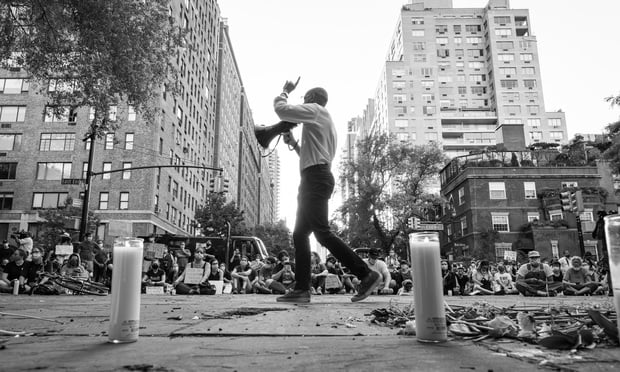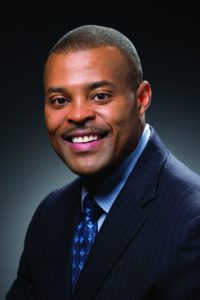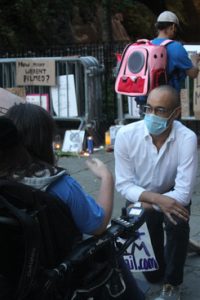Law Firms Are Supporting Attorney Activism, But Some Fear It Won't Last
"I wanted to create a safe space where I could integrate my passion for social justice with the job," said Debevoise associate Justin Maffett, who said the firm has been supportive.
June 17, 2020 at 03:59 PM
6 minute read
 Justin Maffett of Debevoise & Plimpton. Photo by Andre Legaspi
Justin Maffett of Debevoise & Plimpton. Photo by Andre Legaspi
Debevoise & Plimpton first-year associate Justin Maffett was protesting racial injustice when he was arrested on the Upper East Side of Manhattan earlier this month and charged with a misdemeanor for breaking an 8 p.m. curfew.
When he came to Debevoise in 2019, he said, he was honest with partners about his commitment to economic and racial justice. "From day one, I wanted to create a safe space where I could integrate my passion for social justice with the job," he said.
And Debevoise has been supportive of his efforts thus far, including providing representation on the city's misdemeanor charges on his arrest, he said.
In the wake of George Floyd's death at the hands of Minneapolis police and the national protests that followed, large law firms—like many of their corporate clients—are going to great lengths to become more visible in support of attorneys' own activism efforts. Firms are supporting lawyers or staff who have demonstrated, in addition to issuing statements denouncing racism, ramping up pro bono work and offering large donations to various nonprofits.
Norton Rose Fulbright is giving paid time off to employees to attend protests. Katten Muchin Rosenman announced a "Day of Reflection" — a paid day off from work — to encourage employees to engage in a community cause, such as a peaceful protest. Wilmer Cutler Pickering Hale and Dorr said it will provide legal assistance to "members of our community" who are arrested in any peaceful protest. Some firms are also providing pro bono help to protesters beyond their own employees, as part of their pledges to expand their pro bono work.
But while lawyers agree that the legal industry is handling this moment differently than other times of social unrest, many are concerned about how long Big Law's—and society's—commitment will last.
William K. Whitner, chairman of Paul Hastings' complex litigation and trial practice group, as well as co-chairman of the firm's diversity council, said the legal industry is off to a good start in vocalizing support for racial justice causes but sustained momentum is still in doubt.
"We can't lose this opportunity while people are speaking out," Whitner said. "I fear if that moment starts to ease, people will find it too risky."
'Silence' Is Part of the Problem
Attorney activism has manifested itself in several ways. There are attorneys such as Maffett, who took a peaceful stance in a nonviolent protest. A couple of other lawyers, including now-suspended Pryor Cashman associate Colinford Mattis, have been charged in connection with a Molotov cocktail attack on a police vehicle.
 William K. Whitner. Courtesy photo.
William K. Whitner. Courtesy photo.Whitner said he believed the normal lawyer pitfalls associated with speaking out on social or political issues, potentially offending a client or going against the grain of a conservatively risk-averse firm, have been somewhat tempered by the overwhelming evidence of culpable police officers, including Derek Chauvin, who is charged with second-degree murder in Floyd's death.
The voices speaking out in unison against law enforcement violence and prejudice against black Americans are fueled, in part, by the nature of the police's actions against Floyd and the need to no longer stay silent, he added.
"It highlighted the problem of people doing nothing, what silence and acquiescence can do," Whitner said. "They [the three other officers on the scene] played a part. For so many people, typically the mindset is, 'It's not me, I'm not the problem.' This situation highlights that doing nothing is part of the problem."
People also feel more comfortable speaking out because of the circumstances underlying Floyd's death, Whitner added.
"It wasn't something that happened quickly or was because of a snap reaction [by police]," he said. "It didn't leave any area for disagreement about it being wrong."
One way Whitner feels Big Law can make an impact that resonates past the swell of initial support is by being more strategic in pro bono efforts.
"Firms are committed to pro bono, but it isn't necessarily targeted to an end goal. We have the bodies and the capability to do that," Whitner said. "We have the skill set."
Others, including McDermott Will & Emery chairman Ira Coleman, agree that "this time is different."
"We've always encouraged our people to stand up for social justice and to fight for racial equality through our pro bono and community efforts," Coleman said in an email, but now "people are heartbroken and outraged, rightfully so, and want to seize this moment to create enduring change."
Balance and Fear
For Maffett, it can be difficult to be both a corporate attorney and a social activist.
"The balancing act for me has come in the last 36 hours or so," Maffett said earlier this month, shortly after his arrest. "I obviously have billable work I need to get to, calls today that I need to plan for."
 Justin Maffett. Photo by Kat Eastwick
Justin Maffett. Photo by Kat EastwickMaffett believes the coronavirus pandemic and its associated shutdown orders have made this balancing act possible, for him and for others.
"The difference right now is that we are under work-from-home and stay-at-home orders," he said. "With that comes more autonomy over your schedule and the ability to shift your responsibilities around. Working from home, I can multitask in a way that I could not in the office."
But, echoing Whitner, Maffett said he fears that once these orders have been lifted, the momentum of the protests could wane.
"I want to be as optimistic as possible and am heartened by what has been demonstrated in the last few days," he said. But "my concern is that once the city starts to open up, when bars and restaurants are open, people will find other ways to spend their time when they have to start doing the 9-5 again."
Read More:
Law Firms Voice Support for Change—and Pledge to Donate and Take Action
What the Death of George Floyd Should Teach the Legal Industry
Lawyers Accused of Throwing Molotov Cocktail in Brooklyn Protests Return to Jail as 2nd Circuit Grants Stay
This content has been archived. It is available through our partners, LexisNexis® and Bloomberg Law.
To view this content, please continue to their sites.
Not a Lexis Subscriber?
Subscribe Now
Not a Bloomberg Law Subscriber?
Subscribe Now
NOT FOR REPRINT
© 2025 ALM Global, LLC, All Rights Reserved. Request academic re-use from www.copyright.com. All other uses, submit a request to [email protected]. For more information visit Asset & Logo Licensing.
You Might Like
View All
Government Attorneys Face Reassignment, Rescinded Job Offers in First Days of Trump Administration
4 minute read


Energy Lawyers Field Client Questions as Trump Issues Executive Orders on Industry Funding, Oversight
6 minute readLaw Firms Mentioned
Trending Stories
- 1Some Thoughts on What It Takes to Connect With Millennial Jurors
- 2Artificial Wisdom or Automated Folly? Practical Considerations for Arbitration Practitioners to Address the AI Conundrum
- 3The New Global M&A Kings All Have Something in Common
- 4Big Law Aims to Make DEI Less Divisive in Trump's Second Term
- 5Public Notices/Calendars
Who Got The Work
J. Brugh Lower of Gibbons has entered an appearance for industrial equipment supplier Devco Corporation in a pending trademark infringement lawsuit. The suit, accusing the defendant of selling knock-off Graco products, was filed Dec. 18 in New Jersey District Court by Rivkin Radler on behalf of Graco Inc. and Graco Minnesota. The case, assigned to U.S. District Judge Zahid N. Quraishi, is 3:24-cv-11294, Graco Inc. et al v. Devco Corporation.
Who Got The Work
Rebecca Maller-Stein and Kent A. Yalowitz of Arnold & Porter Kaye Scholer have entered their appearances for Hanaco Venture Capital and its executives, Lior Prosor and David Frankel, in a pending securities lawsuit. The action, filed on Dec. 24 in New York Southern District Court by Zell, Aron & Co. on behalf of Goldeneye Advisors, accuses the defendants of negligently and fraudulently managing the plaintiff's $1 million investment. The case, assigned to U.S. District Judge Vernon S. Broderick, is 1:24-cv-09918, Goldeneye Advisors, LLC v. Hanaco Venture Capital, Ltd. et al.
Who Got The Work
Attorneys from A&O Shearman has stepped in as defense counsel for Toronto-Dominion Bank and other defendants in a pending securities class action. The suit, filed Dec. 11 in New York Southern District Court by Bleichmar Fonti & Auld, accuses the defendants of concealing the bank's 'pervasive' deficiencies in regards to its compliance with the Bank Secrecy Act and the quality of its anti-money laundering controls. The case, assigned to U.S. District Judge Arun Subramanian, is 1:24-cv-09445, Gonzalez v. The Toronto-Dominion Bank et al.
Who Got The Work
Crown Castle International, a Pennsylvania company providing shared communications infrastructure, has turned to Luke D. Wolf of Gordon Rees Scully Mansukhani to fend off a pending breach-of-contract lawsuit. The court action, filed Nov. 25 in Michigan Eastern District Court by Hooper Hathaway PC on behalf of The Town Residences LLC, accuses Crown Castle of failing to transfer approximately $30,000 in utility payments from T-Mobile in breach of a roof-top lease and assignment agreement. The case, assigned to U.S. District Judge Susan K. Declercq, is 2:24-cv-13131, The Town Residences LLC v. T-Mobile US, Inc. et al.
Who Got The Work
Wilfred P. Coronato and Daniel M. Schwartz of McCarter & English have stepped in as defense counsel to Electrolux Home Products Inc. in a pending product liability lawsuit. The court action, filed Nov. 26 in New York Eastern District Court by Poulos Lopiccolo PC and Nagel Rice LLP on behalf of David Stern, alleges that the defendant's refrigerators’ drawers and shelving repeatedly break and fall apart within months after purchase. The case, assigned to U.S. District Judge Joan M. Azrack, is 2:24-cv-08204, Stern v. Electrolux Home Products, Inc.
Featured Firms
Law Offices of Gary Martin Hays & Associates, P.C.
(470) 294-1674
Law Offices of Mark E. Salomone
(857) 444-6468
Smith & Hassler
(713) 739-1250










